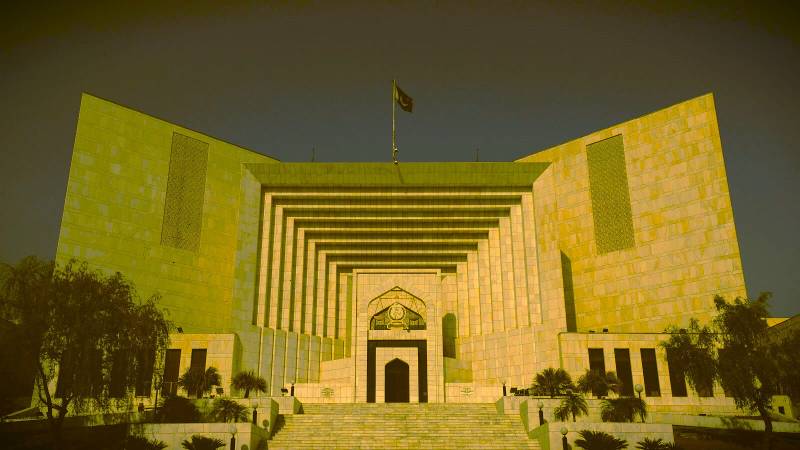
The Supreme Court Monday sought assistance from religious institutions in a case of granting bail to a man accused of blasphemy. They have been asked to submit their opinions within three weeks.
In this regard, notices were issued to the Council of Islamic Ideology (CII), a constitutional body that advises the government and the Parliament on Islamic issues.
Notices were also issued to the Jamia Naima, Darul Uloom in Karachi, the Jamiat Al-Hadith, Quran Academy and the Jamita-ul-Natzaar in Lahore.
This was decided as a three-member bench of the Supreme Court, headed by Chief Justice Qazi Faiz Isa and comprising Justice Muhammad Ali Mazhar and Justice Musarrat Hilali, resumed hearing of a review petition filed by the Punjab government.
In the review petition, the Punjab government sought a modification in the judgment. It contended that in the ninth paragraph of the judgment regarding Article 20 of the Constitution, a modification is required to the extent that the rights of citizens, as 'envisaged under the said article, were not absolute and subject to the law, morality and public order'.
The review petition further contended that the top court's findings, which led to the conclusion, were based on erroneous assumptions of material facts and a misreading of the records. Without adverting to the points of law raised and agitated before the court, the Punjab government argued that "those errors are manifest and apparent on the face of the record."
It went on to argue that the respondent was the principal accused in a case registered in 2022 under Section 295-B and 298-C of the Pakistan Penal Code (PPC) and Section 9(1A) of the Holy Quran (Printing and Recording) Act 2011, in a police station in Chenab Nagar, District Chiniot. The FIR was lodged on a complainant filed by a citizen identified as Muhammad Hassan Muavia.
JI files review petition
During Monday's hearing, Jamaat-e-Islami's (JI) lawyer, Shaukat Aziz Siddiqui, appeared before the bench and informed the court that the political party has also filed a review petition in the case.
Chief Justice Isa told the lawyer they had received the petition, but its contents have yet to be examined.
He directed the court staff to number JI's review petition.
Siddiqui contended that the court had not been provided proper assistance in the case, because of which the verdict issued by the court on February 6 had erred.
He further argued that the accused, at the heart of the case, had never requested to delete the provisions contained in the FIR.
CJP Isa, who faced a vicious media campaign over the February 6 verdict this past week, remarked that he welcomes the review petitions filed against his judgments and the assistance offered, adding that it provided an opportunity to rectify one's mistake.
We do not say we are intellectuals, the chief justice said, adding that he would correct the judgement if there was a mistake.
The option of review against a judgment is given because there could be an error, CJP Isa further remarked, adding that he only fears the Almighty.
Justice Musarrat Hilali asked Attorney General Mansoor Usman Awan whether the case before them was one of bail.
The attorney general responded that a bail application had indeed been moved, while a second application sought amendments in the charge sheet filed against the petitioner.
Advocate Kamran Murtaza, who is affiliated with the Jamiat-e-Ulema-e-Islam (JUI) — whose chief Maulana Fazlur Rehman had issued a video statement against the chief justice, was also present during the hearing. CJP Isa asked Murtaza whether he had filed a review petition. Murtaza responded that the petition was in the process of being filed.
Chief Justice of Pakistan Isa remarked that the court shall seek assistance from scholars and religious institutions.
At this, JI's counsel said he would submit a list to the top court containing the names of important and respected religious schools across the country.
The chief justice remarked that they would issue notices to some important religious madrassas and hear their opinion on the matter, adding that the court would hear anyone who wants to assist, but all such opinions should be submitted in a written format.
During the hearing, the chief justice lamented the incident which took place in Lahore the other day. He also recalled an incident in Sialkot where a Sri Lankan national was lynched to death, observing that such incidents should not happen.
The chief justice observed that it would be wrong if someone takes the law into their hands, adding that the law should take its course if someone has committed a crime.
Justice Hilali cautioned against raising questions on their faith, adding that it was a matter between them and God.
"You don't question our faith, we don't question yours," added Chief Justice Isa
Referring to Imam Malik — one of the major Islamic scholars — CJP Isa observed that he had once said to convey difference of opinion in such a way that if the sparrows are sitting on the head of the person in front, they should not fly away.
If a mistake has been made, it can be rectified, the chief justice reiterated, further remarking that it would be wrong to say that he never made a mistake in any of his judgments. However, he clarified that the court would hear JI on the constitutional aspect while only respondents would be heard on the merits of the case.
In this regard, Siddiqui, the counsel for JI, requested the bench to issue a notice to former Ruet-e-Hilal chief Mufti Muneebur Rehman.
The chief justice observed that whoever wants to assist the court to the extent of the judgment may do so. The court said it would not issue a notice to individuals but only to institutions, adding that the court would not decide on personal differences.
Following these remarks, the court adjourned further hearing in the case for three weeks.

